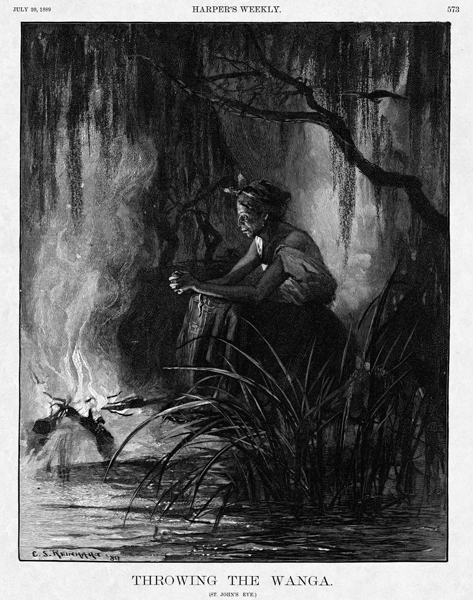Hoodoo in America: The Deep History of Old Plantation Religion
Throwing the Wanga, 1889

As an African American, are you open to exploring ancestral religion brought to America?
Hoodoo as a Connector to Ancestral Healing and Wisdom for African Americans
This is a story about Dinkie the Kufwa King, or the King of Death, translated from Kongo language. Dinkie was an oracle who came to America from the Manden Kingdom of West Africa. Police, judges, slaves, the whole community would step to the side when Dinkie was coming through. He knew of the unseen, and he carried "the powders" (referring to ground roots, graveyard dirt, or herbs), so nobody thought it was a good idea to mess with him. He wore a snake skin around his neck with a petrified frog in one pocket and a dried lizard in the other. It was said by slaves and slavemasters that he sold his soul to the devil. Post-crusade and witch hunt-era Europeans were deathly afraid of the devil, so it made sense that they would fear a man who had no concept of the devil in the context they understood him in.
Black people in America are looking for an identity. We want to be so many things because we don't know what or who we are to begin with. So this is a piece of an aspect that I don't hear many talk about.
The Middle Passage- Understanding Ratio of Slave to Master
African Americans are primarily of West African descent, with many Native American and European admixture lineages within our majority African descent group. Countries like Kongo, Ghana, Nigeria, Sierra Leone, Burkina Faso, Guinea, and parts of Cameroon and Niger were major sites of departure for future slaves. They took their culture with them on their sometimes permanent, sometimes temporary trips down through the Caribbean, to the Eastern coast of the Americas. In Haiti, Cuba, and Brazil, the agricultural and mining crops required so much work that slaves lived an average of 10 years, and a new shipment of slaves had to be brought in rather frequently. Slave to master ratio was 10 to 1, so supervision was much lower in the U.S. whose ratio was 5 to 1. Cultural retention was much "easier" in the Caribbean and South America while In the U.S., generational conditioning was much more prominent.
Through the practice of Voodoo in Haiti and the U.S., hoodoo, Santeria in Cuba, Candomble in Brazil, Obeah in Jamaica, or Sanse in Puerto Rico, people of those Yoruba, Akan, Fon, and Kongo cultures retained many of their spiritual traditions by syncretizing or combining Christian and Catholic saints with the Orisha.
In the U.S., however, black people were distanced from the spiritual language that those of us in the Caribbean and South America were fortunate enough to retain. European British gave Christianity to their slaves through rape, torture, and that repeating cycle through generational conditioning left us with Hoodoo as we know it today.
Understanding the Disconnection
Hoodoo and African Traditional Religion researcher and professor at Rutgers University Katrina Hazzard Donald defines hoodoo as "the indigenous, herbal, healing, and supernatural controlling spiritual folk tradition of the African American in the US. It is the reorganized remnants of what must have been a full-blown syncretized African based religion among slaves in the southern US." Scholars and even practitioners of African-based religions in large part agree that hoodoo is not a religion, and none of us may ever know the magnitude of root work or conjure since slaves were killed for practicing unless it was in secret or in service to their masters. But The function of a belief system is to make sense of experience and reality. A historic view of hoodoo as a system of belief addresses every problem that African Americans have faced in the U.S.- spiritual, mental, and physical protection and healing, both reactive and proactive. By definition, hoodoo is a religion based on those facts.








